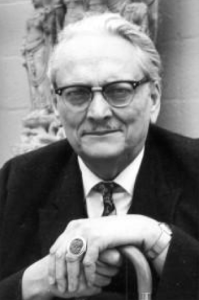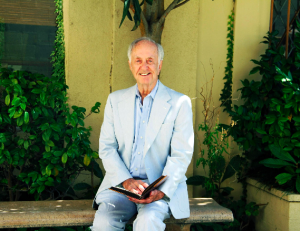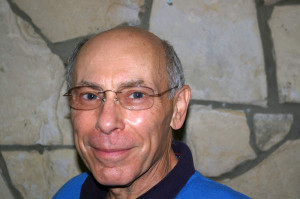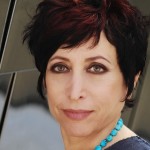The 7 Most Intriguing Philosophical Arguments for the Existence of God
Nietzsche said God is dead, but here are seven fascinating and provocative philosophical arguments for the existence of God.
This article originally appeared on io9.com, and is reprinted here with their permission.
Nietzsche is famous for saying that God is dead, but news of The Almighty’s demise may have been greatly exaggerated. Here are some of the most fascinating and provocative philosophical arguments for the existence of God.
To be clear, these are philosophical arguments. They’re neither rooted in religious scripture nor any kind of scientific observation or fact. Many of these arguments, some of which date back thousands of years, serve as interesting intellectual exercises, teasing apart what we think we know about the universe and our place within it from what we think we’re capable of knowing. Other arguments, like the last two listed, are attempts to reconcile questions that currently plague scientists and philosophers.
Now, none of these arguments make a definitive case for the existence of God, and many of them are (fairly) easily debunked or problematized (as I’ll try to show). But at the very least, they offer considerable food for thought.
Finally, by “God” or “god,” we’re not talking about any specific religious deity. As this list shows, the term can encompass everything from a perfect, omnipotent being to something that can be considered even a bit banal.
1) The very notion of an all-perfect being means God has to exist
This is the classic ontological, or a priori, argument. It was first articulated in 1070 by St. Anselm, who argued that because we have a conception of an all-perfect being — which he defined as “that than which nothing greater can be conceived” — it has to exist. In his essay “Proslogion,” St. Anselm conceived of God as a being who possesses all conceivable perfection. But if this being “existed” merely as an idea in our minds, then it would be less perfect than if it actually existed. So it wouldn’t be as great as a being who actually existed, something that would thus contradict our definition of God — a being who’s supposed to be all-perfect. Thus, God must exist.
Okay, admittedly, this sounds a bit weird by modern standards. Actually, it even sounded weird back then; Gaunilo of Marmoutiers ripped apart Anselm’s idea by asking people to conceive of an island “more excellent” than any other island, revealing the flaws in this type of argumentation. Today, we know that this type of a priori argument (i.e., pure deduction) is grossly limited, often tautological, and utterly fails to take empirical evidence into account.
But surprisingly, it was a position defended by none other than Rene Descartes. His take on the matter is a bit more illustrative; Descartes, in his “Fifth Meditation,” wrote that the conception of a perfect being who lacks existence is like imagining a triangle whose interior angles don’t sum to 180 degrees (he was big on the notion of innate ideas and the doctrine of clear and distinct perception). So, because we have the idea of a supremely perfect being, we have to conclude that a supremely perfect being exists; to Descarte, God’s existence was just as obvious, logical, and self-evident as the most basic mathematical truths.
2) Something must have caused the Universe to exist
Philosophers call this one the First-Cause Argument, or the Cosmological Argument, and early advocates of this line of reasoning included Plato, Aristotle, and St. Thomas Aquinas. It’s predicated on the assumption that every event must have a cause, and that cause in turn must have a cause, and on and on and on. Assuming there’s no end to this regression of causes, this succession of events would be infinite. But an infinite series of causes and events doesn’t make sense (a causal loop cannot exist, nor a causal chain of infinite length). There’s got to be something — some kind of first cause — that is itself uncaused. This would require some kind of “unconditioned” or “supreme” being — which the philosophers call God.
I’m sure you’ve already come up with your own objections to the First-Cause Argument, including the issue of a first-causer having to have its own cause. Also, infinity does in fact appear to be a fundamental quality of the universe. All this said, however, cosmologists are still struggling to understand the true nature of time and what “caused” the Big Bang to happen in the first place.
3) There has to be something rather than nothing
Called the Cosmological Argument from Contingency, this is a slightly different take on the First-Cause Argument. The German philosopher Gottfried Leibniz put it best when he wrote,
Why is there something rather than nothing? The sufficient reason … is found in a substance which … is a necessary being bearing the reason for its existence within itself.
Because it’s impossible for only contingent beings to exist, he argued, a necessary being must exist — a being we call God. Writing in “Monadology,” he wrote that “no fact can be real or existing and no statement true without a sufficient reason for its being so and not otherwise.”
More recently, the philosopher Richard Swinburne looked at the issue more inductively, writing,
There is quite a chance that if there is a God he will make something of the finitude and complexity of a universe. It is very unlikely that a universe would exist uncaused, but rather more likely that God would exist uncaused. The existence of the universe…can be made comprehensible if we suppose that it is brought about by God.
4) Something had to have designed the Universe
The Design Argument, or teleological argument, suggests we live in a Universe that surely had to be designed. The cosmos, goes the argument, exhibits orderliness and (apparent) purpose — for example, everything within the universe adheres to the laws of physics, and many things within it are correlated with one another in a way that appears purposeful. As William Paley argued, just as the existence of a watch indicates the presence of an intelligent mind, the existence of the universe and various phenomena within it indicates the presence of an even greater intelligence, namely God.
Needless to say, this line of argumentation was far more compelling prior to the advent of naturalism (the idea that everything can be explained without the benefit of supernatural intervention) and Darwinian evolution. Indeed, Darwin served as a kind of death knell to the Design Argument, at least as far as the biological realm is concerned. We know that the human eye — in all its apparent complexity and purpose — is not the product of a designer, but rather the painstaking result of variation and selection.
But the Design Argument isn’t entirely dead yet. The exquisite fine-tuning of the “biophilic universe” has lead some to conclude there is in fact a greater intelligence at work. To counter this line of reasoning, however, philosophers say we should simply defer to the anthropic principle, which is interesting because theists say the same thing!
5) Consciousness proves that immaterial entities exist
We still don’t have a working theory of consciousness, giving rise to the notorious Hard Problem. Indeed, subjective awareness, or qualia, is quite unlike anything we normally deal with in our otherwise material universe. The weirdness of consciousness, and our inability to understand it, has given rise to the notion of substance dualism, also known as Cartesian dualism, which describes two fundamental kinds of stuff: the mental and the material. Dualists say that material on its own is incapable of producing qualia — one’s capacity to have internal thoughts, subjective awareness, and feelings.
Theists have used substance dualism to make the claim for an independent “realm” of existence that’s distinct from the physical world. It’s a scenario similar to the one experience by Neo in “The Matrix”; his mental experiences occurred in a realm separate from the one that hosted his body. Theistic philosophers have taken this idea to the next level, using it to infer the existence of otherworldly or immaterial entities, including God. It’s a bit of a stretch, and an argument that could use a lot more evidence.
6) We’re living in a computer simulation run by hacker gods
God is in the eye of the beholder. Unlike Anselm’s take on God as something “that which nothing greater can be conceived,” gods can also consist of entities vastly beyond our comprehension, reach, and control. If the Simulation Hypothesis is true, and we’re the product of posthuman ancestors (or some unknown entity), we simply have no choice but to recognize them as gods. They’re running the show, and our collective (or even individual) behavior may be monitored — or even controlled — by them. These hacker gods would be akin the gnostic gods of yesteryear — powerful entities doing their own thing, and without our best interests in mind.
7) Aliens are our gods
We have yet to make contact with an extraterrestrial intelligence, but that doesn’t mean they’re not out there. A possible solution to the Fermi Paradox is the notion of directed panspermia — the idea that aliens spark life on other planets, like sending spores or probes to fertile planets, and then leave, or monitor and control the process covertly. By definition, therefore, they would be like gods to us.
This idea has been addressed many times in scifi, including the “Star Trek: The Next Generation” episode “The Chase”, in which a god-like species is responsible for all life in the Alpha Quadrant, or Ridley Scott’s “Prometheus,” in which an alien can be seen seeding the primordial Earth with life. Even Arthur C. Clarke’s “2001” is a take on this idea, with the monoliths instigating massive evolutionary leaps.

 Manly P. Hall, the Philosophical Research Society’s first president, was a seeker and lover of wisdom, the very definition of a philosopher. He had the courage and the raw intellectual energy to look for wisdom in places most men had long since forgotten about, or never knew existed. He lived in an era when most Americans did not look toward other cultures and traditions, without looking down. Yet during such times, Manly P. Hall spoke, and wrote extensively, of the wisdom found in all ancient traditions. In an age when serious study of “other religions” was anathema to most, he found deep crosscultural threads and revealed many interconnected roots of modern religious expression. Neither Guru nor Saint, he made no claim of perfection, far from it; but his work is exceedingly rare in its grand scope, detail and synthesis. He embraced the wisdom of every tradition, and, with a fluid command of their obscure and complex contents, worked to express their unifying truths. His legacy is over 200 printed volumes, 8000 lectures, a hand picked library which is one of the finest in the field, and a Society and University that continue in his spirit of universal exploration and learning.
Manly P. Hall, the Philosophical Research Society’s first president, was a seeker and lover of wisdom, the very definition of a philosopher. He had the courage and the raw intellectual energy to look for wisdom in places most men had long since forgotten about, or never knew existed. He lived in an era when most Americans did not look toward other cultures and traditions, without looking down. Yet during such times, Manly P. Hall spoke, and wrote extensively, of the wisdom found in all ancient traditions. In an age when serious study of “other religions” was anathema to most, he found deep crosscultural threads and revealed many interconnected roots of modern religious expression. Neither Guru nor Saint, he made no claim of perfection, far from it; but his work is exceedingly rare in its grand scope, detail and synthesis. He embraced the wisdom of every tradition, and, with a fluid command of their obscure and complex contents, worked to express their unifying truths. His legacy is over 200 printed volumes, 8000 lectures, a hand picked library which is one of the finest in the field, and a Society and University that continue in his spirit of universal exploration and learning. The President of PRS is Obadiah S. Harris. He combines his skills as a community educator and administrator with study of the world’s wisdom traditions to continue the legacy and pursuits of the PRS into the present day. Dr. Harris received his Ph.D. in Educational Administration from the University of Michigan as a Stewart Mott Foundation Fellow. His background includes long service as Associate Professor and Director of the Center for Community Education at New Mexico State University, and as Associate Professor and Director of the Regional Center for Community Education at Arizona State University. Dr. Harris’s study and practice of the great Eastern and Western Wisdom Traditions has helped shape and direct his life.
The President of PRS is Obadiah S. Harris. He combines his skills as a community educator and administrator with study of the world’s wisdom traditions to continue the legacy and pursuits of the PRS into the present day. Dr. Harris received his Ph.D. in Educational Administration from the University of Michigan as a Stewart Mott Foundation Fellow. His background includes long service as Associate Professor and Director of the Center for Community Education at New Mexico State University, and as Associate Professor and Director of the Regional Center for Community Education at Arizona State University. Dr. Harris’s study and practice of the great Eastern and Western Wisdom Traditions has helped shape and direct his life. Lionel Corbett MD, University of Manchester, England; Diplomate in Psychological Medicine; Diplomate Jungian Analyst, C.G. Jung Institute of Chicago is a British-trained psychiatrist and Jungian analyst, Dr. Corbett is particularly interested in the synthesis of psychoanalytic and Jungian ideas. His primary dedication has been to the religious function of the psyche, especially in the way in which personal religious experience is relevant to individual psychology, and to the development of psychotherapy as a spiritual practice. He is the author of “The Religious Function of the Psyche,” and “Psyche and the Sacred: Spirituality Beyond Religion.”
Lionel Corbett MD, University of Manchester, England; Diplomate in Psychological Medicine; Diplomate Jungian Analyst, C.G. Jung Institute of Chicago is a British-trained psychiatrist and Jungian analyst, Dr. Corbett is particularly interested in the synthesis of psychoanalytic and Jungian ideas. His primary dedication has been to the religious function of the psyche, especially in the way in which personal religious experience is relevant to individual psychology, and to the development of psychotherapy as a spiritual practice. He is the author of “The Religious Function of the Psyche,” and “Psyche and the Sacred: Spirituality Beyond Religion.” Dr. Nicki J. Monti is not your typical therapist. Dr. Nicki instantly gets to the core of presented issues, and immediately provides a clear path for genuine change. Her no-nonsense approach combines with extraordinary compassion and good humor to offer a clear, authoritative voice free of judgment and full of possibility. She quickly brings forward what others have somehow missed and then offers practical tools for truly productive resolution. She uses wit and her own experiences to reveal what’s undermining you, and to get you beyond being ‘stuck in your own story.’
Dr. Nicki J. Monti is not your typical therapist. Dr. Nicki instantly gets to the core of presented issues, and immediately provides a clear path for genuine change. Her no-nonsense approach combines with extraordinary compassion and good humor to offer a clear, authoritative voice free of judgment and full of possibility. She quickly brings forward what others have somehow missed and then offers practical tools for truly productive resolution. She uses wit and her own experiences to reveal what’s undermining you, and to get you beyond being ‘stuck in your own story.’